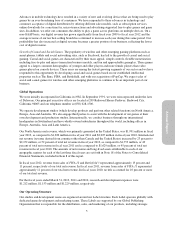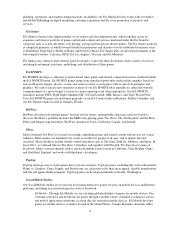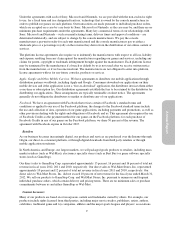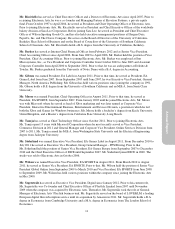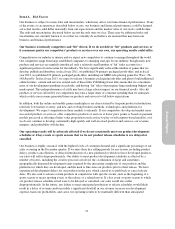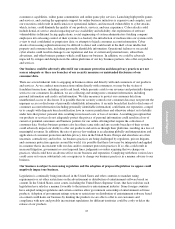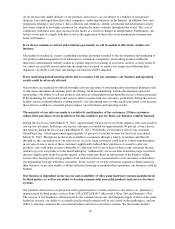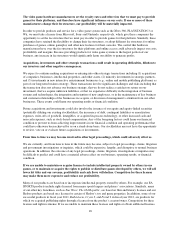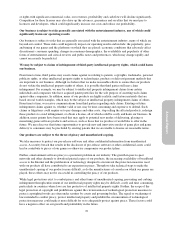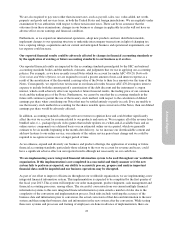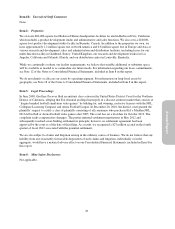Electronic Arts 2012 Annual Report Download - page 99
Download and view the complete annual report
Please find page 99 of the 2012 Electronic Arts annual report below. You can navigate through the pages in the report by either clicking on the pages listed below, or by using the keyword search tool below to find specific information within the annual report.
Annual Report
ecommerce capabilities, online game communities and online game play services. Launching high profile games
and services, and creating the appropriate support for online business initiatives is expensive and complex, and
our execution could result in inefficiencies or operational failures, and increased vulnerability to cyber attacks,
which, in turn, could diminish the quality of our products, services, and user experience. Cyber attacks could
include denial-of-service attacks impacting service availability and reliability; the exploitation of software
vulnerabilities in Internet facing applications; social engineering of system administrators (tricking company
employees into releasing control of their systems to a hacker); the introduction of malware into our systems with
a view to steal confidential or proprietary data; or attempts to hijack consumer account information. Cyber
attacks of increasing sophistication may be difficult to detect and could result in the theft of our intellectual
property and consumer data, including personally identifiable information. Operational failures or successful
cyber attacks could result in damage to our reputation and loss of current and potential users, subscribers,
advertisers, and other business partners which could harm our business. In addition, we could be adversely
impacted by outages and disruptions in the online platforms of our key business partners, who offer our products
and services.
Our business could be adversely affected if our consumer protection and data privacy practices are not
seen as adequate or there are breaches of our security measures or unintended disclosures of our
consumer data.
There are several inherent risks to engaging in business online and directly with end consumers of our products
and services. As we conduct more transactions online directly with consumers, we may be the victim of
fraudulent transactions, including credit card fraud, which presents a risk to our revenues and potentially disrupts
service to our consumers. In addition, we are collecting and storing more consumer information, including
personal information and credit card information. We take measures to protect our consumer data from
unauthorized access or disclosure. It is possible that our security controls over consumer data may not prevent the
improper access or disclosure of personally identifiable information. A security breach that leads to disclosure of
consumer account information (including personally identifiable information) could harm our reputation, compel
us to comply with disparate breach notification laws in various jurisdictions and otherwise subject us to liability
under laws that protect personal data, resulting in increased costs or loss of revenue. A resulting perception that
our products or services do not adequately protect the privacy of personal information could result in a loss of
current or potential consumers and business partners for our online offerings that require the collection of
consumer data. Our key business partners also face these same risks and any security breaches of their system
could adversely impact our ability to offer our products and services through their platforms, resulting in a loss of
meaningful revenues. In addition, the rate of privacy law-making is accelerating globally and interpretation and
application of consumer protection and data privacy laws in the United States, Europe and elsewhere are often
uncertain, contradictory and in flux. As business practices are being challenged by regulators, private litigants,
and consumer protection agencies around the world, it is possible that these laws may be interpreted and applied
in a manner that is inconsistent with our data and/or consumer protection practices. If so, this could result in
increased litigation, government or court imposed fines, judgments or orders requiring that we change our
practices, which could have an adverse effect on our business and reputation. Complying with these various laws
could cause us to incur substantial costs or require us to change our business practices in a manner adverse to our
business.
Our business is subject to increasing regulation and the adoption of proposed legislation we oppose could
negatively impact our business.
Legislation is continually being introduced in the United States and other countries to mandate rating
requirements or set other restrictions on the advertisement or distribution of entertainment software based on
content. In the United States, most courts, including the United States Supreme Court, that have ruled on such
legislation have ruled in a manner favorable to the interactive entertainment industry. Some foreign countries
have adopted ratings regulations and certain countries allow government censorship of entertainment software
products. Adoption of government ratings system or restrictions on distribution of entertainment software based
on content could harm our business by limiting the products we are able to offer to our customers and
compliance with new and possibly inconsistent regulations for different territories could be costly or delay the
release of our products.
15


